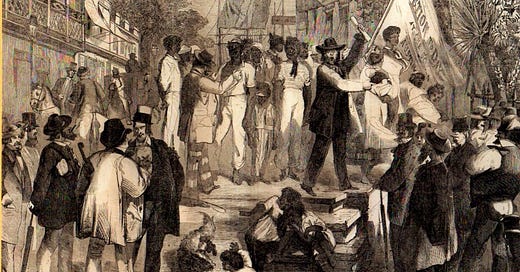Would you be kind enough to consider becoming a “Black Books, Black Minds” member supporter?
At $6.00/month or $60.00 year, your funds will help me continue to build this labor of love and deliver great Black History content to you.
Click below to update. Every little bit counts
Thank you!
Diamond-Michael Scott
As a Black man navigating the complex narratives of American history and its lingering effects on today’s society, I have encountered a wide range of perspectives on the legacy of slavery.
My conversations with some of my vanilla brothas and sistas have often revealed a troubling reluctance to acknowledge the destructive impact of slavery on Black families throughout history. Instead of acknowledging the deep-seated systemic issues that have roots in centuries of oppression, the narrative is frequently shifted towards blaming the current struggles of Black America on the supposed disintegration of Black families, effectively gaslighting the real issue at hand.
Anne C. Bailey's book, “The Weeping Time: Memory and the Largest Slave Auction in American History,” serves as a poignant counter to such narratives, shedding light on a critical moment in history that exemplifies the traumatic rupture of Black families due to slavery.
The Weeping Time refers to a two-day auction in March 1859, where over 400 enslaved Black people were sold in Savannah, Georgia on what was known as the Butler Plantation. This event stands as the largest sale of enslaved individuals in the history of the United States, a grim testament to the commodification of human life under slavery.
Bailey’s meticulous research and shocking narrative weave together historical records, personal stories, and the broader implications of the auction for understanding America's racial past and present. Through her exploration, Bailey not only reconstructs the events of those two days in vivid detail but also examines the enduring legacy of such actions on the descendants of those sold and the wider Black community.
The book challenges readers to confront the painful realities of how slavery systematically dismantled Black families, stripping them of the ability to maintain kinship ties, cultural heritage, and a sense of stability.
The Weeping Time is not merely a recounting of a historical event; it is an exploration into the collective memory of a community forever altered by the atrocities of the slave trade. Bailey delves into the psychological and emotional toll inflicted on those who were sold and those who remained, painting a harrowing picture of the immediate and generational trauma of family separation.
Her work underscores the fact that the ramifications of these separations are not confined to the past; they have perpetuated a cycle of socioeconomic disadvantages and emotional scars that continue to affect Black families to this day.
Contrary to the assertions of those who seek to downplay the significance of slavery, Bailey's book makes it clear that the stain of this period is intricately linked to the challenges faced by Black America at present. The systematic destruction of family units, denial of education, and legal disenfranchisement served not only to dehumanize Black people but also to lay the groundwork for systemic inequalities that persist. By illuminating these connections, Bailey invites readers to consider how historical injustices continue to shape societal attitudes and policies.
The Weeping Time also serves as a critical reminder of the resilience and strength of Black families in the face of relentless adversity. Despite the efforts to erase their identities and histories, Black America has tirelessly worked to reclaim their narratives and forge a sense of community and solidarity. This resilience is a testament to the indomitable spirit of those who have fought and continue to fight against the remnants of slavery’s legacy.
In reflecting on my conversations with individuals who refuse to acknowledge the depth of slavery's impact, I am reminded of the importance of works like Bailey’s. They offer a grounded perspective that challenges revisionist histories and calls for a nuanced understanding of America's racial dynamics. The Weeping Time is not just a book about the past; it is a powerful commentary on the importance of memory, truth, and the ongoing struggle for justice and equality.
The lack of acknowledgment of slavery’s destructive impact on Black families not only undermines the experiences of millions of Black Americans but also impedes the nation's ability to reconcile with its past. Acknowledging this history is not about assigning blame; it's about understanding the root causes of present disparities and working towards a more equitable society.
It’s here where books like “The Weeping Time” are essential for educating and reminding us of the long-lasting effects of slavery, along with the need for empathy, understanding, and action in addressing its consequences.






I'll have to read this one. So many of us seem to lack a basic grasp of history -- maybe not surprising, given what's glossed over in schools. I know I'm still learning everyday and can't claim perfection by any means. But it pains me when someone seems unwilling to understand, or simply blissfully unaware there might be something more to why various inequalities persist and why our society operates like it does, how institutional racism is still very much a thing, etc. I read lots of drivel from people re: race in America that might sound perfectly logical if, you know, you entirely ignore all the ways our past interacts with our present. Bryan Stevenson's Legacy Museum in Alabama does an incredible job of connecting dots, focused specifically on the slavery to mass incarceration pipeline. I have to admit I hadn't thought too deeply about how Black families were separated until I visited that museum. Most of what I remember from my school days is a whitewashed "good people helped on the Underground Railroad" summary.
It's remarkable that an event that was, sadly, common for its time would have such a resounding impact on the people involved and their nation many years later.